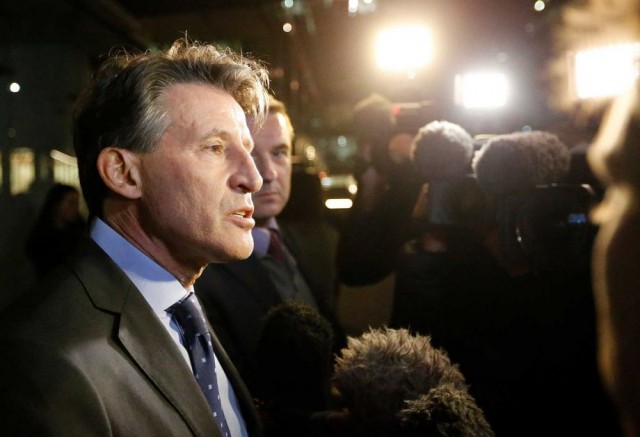
IAAF President Sebastian Coe gives a statement to journalists outside his office in London, Friday, Nov. 13, 2015. Russia’s track and field federation has been suspended by governing body IAAF. AP
LONDON — Calling it a wake-up call for a sport in a “shameful” position, IAAF President Sebastian Coe said Russia will be banned from next year’s Olympics unless it convinces the world it has cleaned up its act on doping.
The sport’s governing body provisionally suspended Russia’s track and field federation on Friday, four days after the country was accused of operating a vast, state-sponsored doping program in a damning report by a World Anti-Doping Agency commission.
The move bars Russia from all international track and field competition for an indefinite period, including the 2016 Olympics in Rio de Janeiro, until the country is judged to have fixed its problems and fallen into line with global anti-doping rules.
Coe called the decision — approved 22-1 in a secret vote of the IAAF council via teleconference — “the toughest sanction we can apply at this time.” It’s the first time the International Association of Athletics Federations has ever banned a country over its doping failures.
“The whole system has failed the athletes, not just in Russia but around the world,” Coe said after a meeting that lasted nearly 3 1/2 hours. “This has been a shameful wake-up call and we are clear that cheating at any level will not be tolerated.”
“It makes me angry,” added Coe, a two-time Olympic 1,500-meter champion from Britain. “We find ourselves in a shameful position tonight.”
Coe, who was elected IAAF president in August, had been under heavy pressure to take tough action, despite efforts by Russian officials to avoid a blanket ban by agreeing to cooperate and make reforms in their anti-doping system.
“This is not about politics, this is about protection of clean athletes,” Coe said. “It is why our council has sent such a strong message.”
Coe said Russia will need to fulfill “a list of criteria” to win reinstatement. An independent inspection team led by Norwegian anti-doping expert Rune Andersen will be appointed in the next few days to verify Russia’s progress.
Still uncertain is whether the Russian federation will be able to reform in time for its athletes to compete at the Rio Games, which run from Aug. 5-21.
“It is entirely up to the Russian federation and Russia to enact those changes,” Coe said. “Our verification team will be tough. … It is for the IAAF and no other organization to make that judgment. We will get the change that we want and only then will Russian athletes be able to return to competition.”
Russian Sports Minister Vitaly Mutko said he is hopeful Russia will be able to compete at the world indoor championships in Portland, Oregon, from March 17-20.
“Anyway, the main thing is the Olympics,” he said.
Unless the Russian federation voluntarily accepts a full suspension, the IAAF will hold a hearing to elevate the provisional penalty to a full suspension.
Russia will also be stripped of hosting the world race walking team championships in Cheboksary from May 7-15, and the world junior championships in Kazan from July 19-24.
Russian athletes are eligible to compete in their own national events during the ban.
Russia’s IAAF council member, Mikhail Butov, addressed Friday’s meeting but did not take part in the vote. He said Russia’s return to competition “will depend on how convincing we are with our case and how objective the commission is.”
“We’ll work with them,” he told reporters in Moscow.
WADA called the IAAF decision “positive news for clean athletes worldwide.”
It came on the same day that a WADA committee found Russia’s national anti-doping agency to be non-compliant with its code. The findings will go to the WADA foundation board, which will vote on it next Wednesday in Colorado Springs, Colorado.
WADA has already suspended the anti-doping laboratory in Moscow.
Travis Tygart, CEO of the U.S. Anti-Doping Agency, said the IAAF’s suspension of Russia was the “only outcome acceptable to clean athletes.”
“The real test now is to ensure full justice and accountability for all their actions before being allowed to compete again,” he said.
Coe announced that Paul Deighton, who served as chief executive of the organizing committee for the 2012 London Olympics, will oversee a program of reform of the IAAF’s governance.
Coe also said he will create an “integrity unit” dealing with doping, illegal betting, age cheating and corruption.
“We need to look at ourselves within our sport, my organization as well,” Coe said, “and we will do that.”

